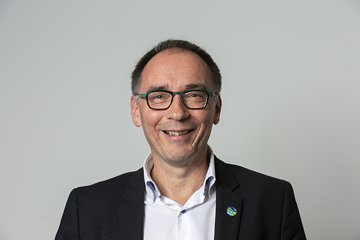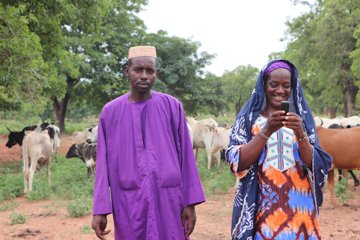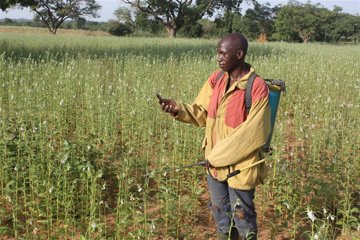'G4AW has driven and accelerated innovations around food security'
The Netherlands invested in the Geodata for Agriculture and Water (G4AW) programme for ten years. In this series, key players look back and look to the future. Ruud Grim was programme manager on behalf of the NSO: 'We have sown for ten years, now it is time to harvest.'

Ruud Grim, programme manager Global Sustainable Development at Netherlands Space Office.
What was the idea behind G4AW?
'Here in the Netherlands we know how great the added value of satellite data and digitisation is for all sorts of applications on earth. In Southeast Asia and Africa it is very different. With the G4AW programme we wanted to show that satellite data encompasses more than just statistical information. We wanted to give smallholder food producers timely access to more reliable information and insurance. And thus contribute to income security and employment in the countries concerned.'
How did this idea land in the world of development cooperation?
'Ten years ago digital tools were hardly associated with development cooperation, if at all. Digitalisation, innovation, satellite services; that was something for companies looking to make a profit. Development cooperation, that was the prevailing view, you did it with people and without an interest in profit. So it was delicate...'
Did it work out well?
'Non-governmental organisations soon saw that a public-private partnership also offers opportunities. And that you can have an impact in developing countries with digitalisation. Millions of smallholder food producers gained access to advisory services and insurance products they did not have before. This led to fewer diseases, increased harvests, more food security and sometimes better income security. Other effects came from this. Children of farmers who were able to go to school more easily. And an increase in local employment in the provision of services.'
And what did it yield on the Dutch side?
'The programme pushed digitalisation further at ministries and NGOs. The benefits for companies were very diverse. For example, Satelligence developed an entire service line for European deforestation regulation partly based on G4AW experiences. And Weather Impact has been able to further develop its global weather and agriculture consultancy service through G4AW.'

©SNV/MODHEM Partnership
Was there one clear success formula behind all the G4AW projects?
'Each of the 25 projects within G4AW was a unique collaboration and in that sense: tailor-made. But the method behind it was the same everywhere. That was the great strength. Different types of organisations and disciplines came together with a common goal. If they managed to work well together, everyone could make a valuable contribution from their own role and responsibility'.
Can you name a concrete example of this?
'I am thinking of the advisory services STAMP in Mali and MODHEM in Burkina Faso. These are not the safest countries. Herders in those countries ask themselves: where should I go with my herds if there is too little vegetation here? The answer came from a simple satellite application that finds suitable grazing grounds. That could only come about because the NGO SNV, local governments, telephone providers, and service providers collaborated with Dutch geodata companies.'
Starting a project is easier than sustaining it. How has this worked out for G4AW projects?
'G4AW is not an "average" programme. We took a big approach, a lot of investment was made by our government, but also by the organisations involved themselves. We have also performed beyond expectations. About half of the developed services are still in use after the end of G4AW in 2023. A quarter of the services have even been scaled up or expanded to other countries. In other words, the number of users and beneficiaries is still growing.'
Innovation is always learning. What unexpected outcomes did the programme have?
'We did not expect a couple of NGOs to embrace digitisation as a strategic tool to achieve impact in their partner countries. That did happen. In the target countries a large number of young people came into contact with digitisation. This helped reduce youth unemployment. In addition, there appeared to be a lot of interest in G4AW from the financial sector. This too we had not seen coming.'
How did the financial sector get involved?
'We helped farmers by giving them advice and action perspectives based on satellite data. What is the best time to sow? To fertilise? And so on. Banks were then asked by farmers: "We have no money to buy seeds or fertiliser, can we take out a loan?". The Dutch Microfinance Platform took up that question. In a new service, Rabobank and Solidaridad are using Dutch satellite services to ensure that farmers can generate extra income from selling carbon credits to large international companies that want to offset their emissions.'

©SNV/MODHEM Partnership
G4AW has also led to insurance for smallholder farmers, how about that?
'A crop is actually the farmer's "income". If a crop fails it leads to poverty. Insuring the crop with field inspections by people is far too expensive. Within G4AW insurance has therefore been developed based on automated inspections with satellite data. At certain limits of drought, for example, insurance money is paid out automatically. You need almost no people for this which makes the service very cheap, and consequently affordable for the farmer. In Uganda an insurance scheme was set up where the government paid half the premium. Currently, insurance is also being worked on in Mali, Mozambique, Togo, and Senegal.'
Would some of all these results have been achieved even without the G4AW programme?
'Of course. Innovation happens everywhere. And certainly in the Netherlands, because we are a knowledge economy. What you can say with certainty is that G4AW has been a driver and accelerator of innovation. And more importantly, that it has produced positive results for vulnerable food producers.'
What is the most important lesson of ten years of G4AW?
'The importance of investing in collaboration. With so many target groups in different countries, projects, participants, and goals, you have to invest an awful lot of time and energy in cooperation. Attention to individual interests of those involved is very important here. If you enable participants to serve their own goals and interests in addition to the end goal you increase the chances of success'.
How will the story of G4AW continue?
'The knowledge and experience we have gained should not be lost. We sowed for ten years. Invested together in a goal that none of the parties involved could have achieved in isolation. Now it is time to reap. That means: scaling up and expanding where it is promising. And applying G4AW's knowledge and experience in other fields. For example, on topics such as salinisation, biodiversity, and extreme weather warning systems. In all these topics a key insight from G4AW is invaluable: how to ensure that innovative, digital services connect to end-users' needs so that they can improve their own position and environment.'